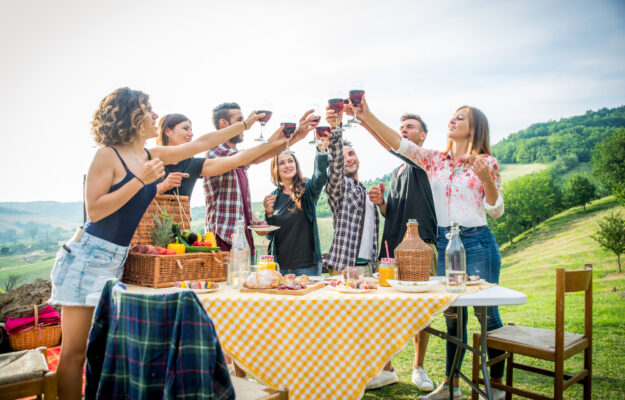From cultural to recreational, will this be the path that wineries will have to take to gain new wine lovers? It is a well known fact that one of the great challenges for the world of wine, both for the present and for the future, is aimed at conquering new generations of consumers. Their habits, increasingly closer to “no alcohol” products or with modest alcohol content, are not compatible with the wine product, in particular with reds, and climate change, which seems unstoppable, will probably only accelerate this phenomenon. But, in the end, are we sure that it is only a question of changing consumption? Some say no. Because the attractiveness of wine, and therefore its consumption, also passes through the experiences that companies can offer “around the glass”, while the “educational” approach now appears limiting, if not superseded, to propose it to modern wine tourist.
A research, reported by “WineBusiness”, offers interesting insights on the issue: Susan DeMatei, president and owner of WineGlass Marketing in Napa, California, a leading marketing agency for the beverage industry, partnered with Quest Mindshare to conduct an independent study of Millennial and Gen X wine drinkers. The 2024 “WineGlass Marketing Wine Consumer Usage and Attitudes” survey was developed with an interview, in February, with 1,613 US wine consumers; 771 were Millennials (aged 28 to 42) and 842 were Gen X (aged 43 to 59). DeMatei had launched the idea by hypothesizing that wine, but also its territory and its culture, are not in tune with younger consumers, whose values differ significantly from older generations, this is the case, for example, of Baby Boomers. The survey results supported this theory: 40% of wine drinkers surveyed believe the wine industry is out of touch with their generations and interests. While Baby Boomers prefer the luxury and educational experience of wine and see expensive purchases as an indicator of financial success, Millennials and Generation X are much more interested in having fun, and are not attracted to long, educational wine tastings. In the webinar DeMatei stated that the modern “wine club” model has been built predominantly around Boomers and their purchasing preferences, however, as “Millennials” become dominant in the spending factor, “wine clubs” will have to change radically to attract them.
It is not true that younger generations don’t drink wine: DeMatei claims that they do and are not afraid to spend money on this product; It is no coincidence that among the wine drinkers who participated in the study, 42% of Millennials and 38% of Gen X reported drinking wine two or three times a week, and both demographic groups drink as much or more wine than they did a year ago. Added to this, 22% of Gen X drinkers said they were mostly comfortable spending $20 (or less) on a bottle of wine, while Millennials are willing to spend 40 (and even more). As a combined group, 81% of participants said finding good value for money is the most important thing when buying wine. While younger generations may be willing to spend more per bottle, they are not purchasing in the same way as their parents. Research has indicated that among regular wine consumers, 20%-25% have not been to a winery, citing distance and busy schedules as major barriers. Both age groups said they typically receive wine recommendations from friends and family, but also find and research wines online, through Google and social media platforms.
DeMatei encourages wineries to join online platforms because this would allow them to win many more customers than a physical store. When younger consumers visit a winery they are looking for a relaxing and enjoyable experience; a survey showed that Millennial and Gen X wine drinkers see a trip to a wine country as an opportunity to relax in an idyllic setting, try new wines and foods and spend quality time with their friends, but this doesn’t fit with what most tasting rooms offer. Boomers, for example, value in-depth educational experiences, while younger consumers prefer a more casual environment. Both millennials and Gen X prefer to visit production sites, walk before reaching a tasting room or enjoy live music as well as visit, and they seem discouraged by an educational experience in a formal location. But, above all, they are not interested in “wine clubs” and the confirmation comes from the numbers, with 80% of Gen X and 63% of Millennials responding that they are not part of it. When asked why, both groups said it was a lack of variety and control, and who prefer to have the freedom to choose what they want to drink, and most will buy wine only when they need it as they don’t have the physical space or financial resources to purchase large quantities every time. To build consumer loyalty, according to DeMatei, wineries will have to refocus on targeted values such as sustainability, and offer experiences that allow to relax and have fun without an excess of information which are not interesting.
Copyright © 2000/2026
Contatti: info@winenews.it
Seguici anche su Twitter: @WineNewsIt
Seguici anche su Facebook: @winenewsit
Questo articolo è tratto dall'archivio di WineNews - Tutti i diritti riservati - Copyright © 2000/2026







































































































































































































